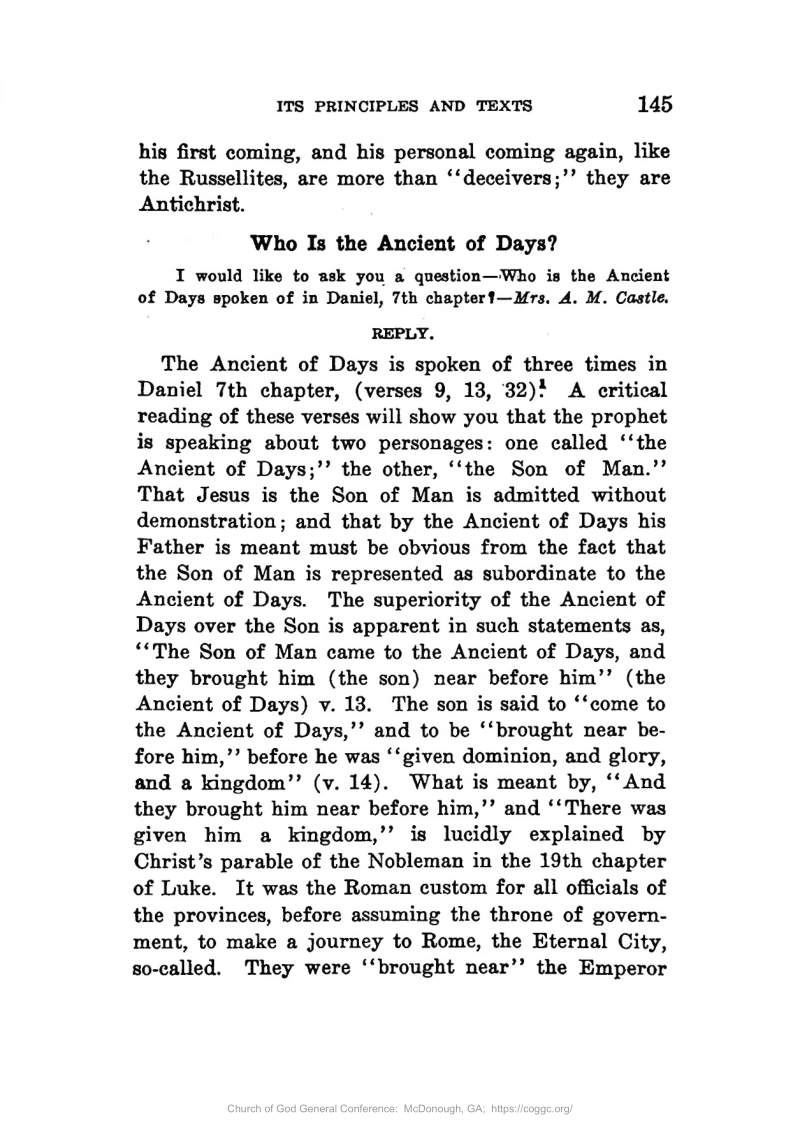Robert G. Huggins interprets Daniel 7 to teach that the “Ancient of Days” is the Father and, by Divine Investiture, the Son, too.
- Type
- Book
- Source
- Robert G. Huggins Non-LDS
- Hearsay
- Direct
- Reference
Robert G. Huggins, The Bible: Its Principles and Texts (Cleveland, Ohio: The Church of the Blessed Hope, 1973), 145-147
- Scribe/Publisher
- The Church of the Blessed Hope
- People
- Robert G. Huggins
- Audience
- Reading Public
- Transcription
Who Is the Ancient of Days? I would like to ask you a question—Who is the Ancient of Days spoken of in Daniel, 7th chapter—Mrs. A. M. Castle
REPLY. The Ancient of Days is spoken of three times in Daniel 7th chapter, (verses 9, 13, 32). A critical reading of these verses will show you that the prophet is speaking about two personages: one called “the Ancient of Days;” the other, “the Son of Man.” That Jesus is the Son of Man is admitted without demonstration; and that by the Ancient of Days his Father is meant must be obvious from the fact that the Son of Man is represented as subordinate to the Ancient of Days. The superiority of the Ancient of Days over the Son is apparent in such statements as, “The Son of Man came to the Ancient of Days, and they brought him (the son) near before him” (the Ancient of Days) v. 13. The son is said to “come to the Ancient of Days,” and to be “brought near before him,” before he was “given dominion, and glory, and a kingdom” (v. 14). What is meant by, “And they brought him near before him,” and “There was given him a kingdom,” is lucidly explained by Christ’s parable of the Nobleman in the 19th chapter of Luke. It was the Roman custom for all officials of the provinces, before assuming the throne of government, to make a journey to Rome, the Eternal City, so-called. They were “brought near” the Emperor in stately style, and then they received from him legal authority or title deeds of their office. Basing his parable upon this Roman custom, Christ represents himself as a Nobleman “going into a far country to receive for himself a kingdom, and to return. ’ V. 12. “And it came to pass, when he had returned, having received the kingdom.’’ V. 15. One grand purpose of Christ’s going to the “far country” (heaven), was to “receive for himself a kingdom.” He was “brought near” the Ancient of Days for this very purpose, that he might receive “dominion, and glory, and a kingdom, that all people, and nations, and languages, should serve him. These things are promised to him, and he is heir of them all, but they have not yet been “given” (Dan. 7: 14) to him; as is manifest from the fact that “all people, nations, and languages” are serving Gentile rulers, and especially that system of government represented by the Greco-Roman Dragon. But when the Son actually “receives for himself a kingdom” he will “return” and “sit in Jerusalem, the Holy City (the true Eternal City), to judge all the nations round about.” Joel 3: 12, 13. Then the saints will “take the kingdom” (Dan. 7: 18, 27) and possess it with him.
Thus you see, Sister Castle, that while the prophecy discriminates between the Ancient of Days and the Son of Man, representing the first as superior to the second, yet in the same chapter the two are blended, and the Son of man is called the Ancient of Days. Verses 9, 22. The description of the Son in the 9th verse compared with the description of Christ in Rev. 1: 12-17 shows they are the same person. How the Ancient of Days can be both the Father and the Son may be a little confusing for a moment, but a few thoughts about the manifestation of the Eternal Father in flesh will clarify the subject. Though the Father is primarily the Ancient of Days, and though he is judge of all (Dan. 7: 10), yet he has delegated to his Son all power in heaven and in earth. Matt. 28: 18. “He has,” to use the language of our Master, “committed all judgment unto the Son;” so it is true in fact that the Father “judgeth no man.” John 5: 22. God’s design in this arrangement is that “all men should honor the Son, even as they honor the Father.” V. 23. As he is God’s Son, like all other children, he has inherited his Father’s name hence is called “the Everlasting Father” Isa. 9:7); “The Lord of Hosts” (Zech. 14: 16; “Our God” (Psa. 30: 3); “the God of the Whole earth.” Isa. 54: 5; Jude 14, and the Ancient of Days.
- Citations in Mormonr Qnas
The B. H. Roberts Foundation is not owned by, operated by, or affiliated with the Church of Jesus Christ of Latter-day Saints.

